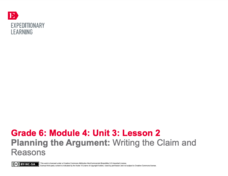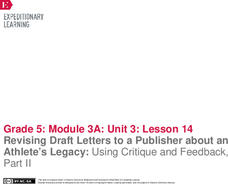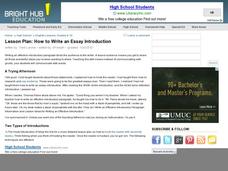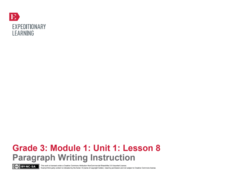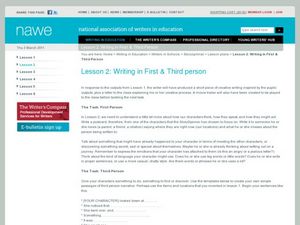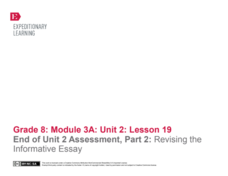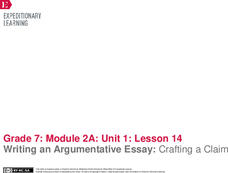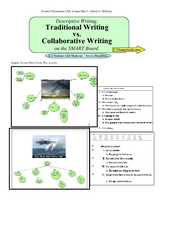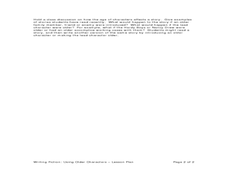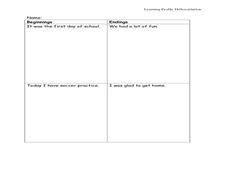EngageNY
Mid-Unit Assessment: Completing My Draft Position Paper
What's the difference? Scholars analyze the similarities and differences between introductory and concluding paragraphs. Then, using a model essay as a guide, they write their draft position papers.
EngageNY
Planning the Argument: Writing the Claim and Reasons
Step up! Using the resource, scholars discover the six steps to writing an effective position paper. Next, they work on a graphic organizer to begin planning their argument-based essays.
EngageNY
Revising Draft Letters to a Publisher about an Athlete’s Legacy: Using Critique and Feedback, Part II
Let's get opinionated. Scholars participate in a peer critique and revision process using a fun activity called a Four Corners strategy. After incorporating classmates' feedback, individuals share their final drafts of their opinion...
EngageNY
Revising Draft Letters to a Publisher about an Athlete’s Legacy: Critique and Feedback, Part I
Pick a corner, any corner! Pupils use the Four Corners strategy and Peer Critique protocol to assess one another's draft letters to a publisher about an athlete's legacy. Scholars then use peer feedback to revise their letters.
Bright Hub Education
How to Write an Essay Introduction
Clichéd and repetitive introductions got you down? Try this lesson on for size! Start off by instructing your class members on techniques for writing introductions and what types of introductions they should avoid. Several general lesson...
EngageNY
Paragraph Writing Instruction
Writing a paragraph from details found directly in a text is the central focus of this thorough and explicit lesson plan. Using the stories Nasreen's Secret School and Rain School, third graders are lead step-by-step through the basics...
EngageNY
Mid-Unit 2 Assessment: On-Demand Informational Writing
Lesson 7 focuses on building academic vocabulary and writing an explanatory letter with supported textual evidence. For the first five minutes of the instructional activity, the educator reminds the class of how to read and refer to the...
Ohio Department of Education
A Glossary of Literary Terms
If you're tired of defining allusion, onomatopoeia, and satire for your language arts students, hand out a complete list of literary devices to keep the terms straight. Each term includes a definition that is easy to understand and...
NASA
Write the Book on Weather Metrics
It's not easy to measure the weather. Pupils learn about what all weather has in common—the atmosphere. Scholars discover how a meteorologists must be able to measure aspects of the atmosphere and decipher the data. They then create a...
Curated OER
Writing in First and Third Person
Explore narrative writing by participating in a role-playing activity. In this perspective lesson, learners define first and third person in writing and discuss how it changes the mood of the reader. The first activity has pupils write...
Curriculum
Expository Writing
The beauty of the way this expository writing resource is structured is that the units can be presented as a complete writing workshop or sequenced throughout a course of study
Curated OER
Chapter 12 Writing: the ABCs of Language
Providing a thorough presentation on the art of written language (and not just English), this slideshow will open your students' eyes to the sociological and linguistic issues surrounding writing systems, both modern and historical. The...
EngageNY
End of Unit 2 Assessment, Part 2: Revising the Informative Essay
Is that your final answer? Scholars discuss the terms, edit, and revise. They then complete their final drafts as the end-of-unit assessment of Unbroken. Writers use their graded draft essays from a previous instructional activity to...
EngageNY
Writing an Argumentative Essay: Crafting a Claim
As scholars prepare to craft their essays based on Katherine Paterson's Lyddie, they learn about using compelling reasons in their writing. Next, they develop a claim about whether Lyddie should sign a petition to speak out against...
Curated OER
Writing a Newspaper Article
The perfect resource for a beginning journalism teacher or someone designing a journalism unit, this activity prompts young scholars to write a newspaper article. It covers all aspects of the writing process, such as a guided warm-up...
Curated OER
Writing Variable Expressions for Physical Models
Explore the concept of writing variable expressions by examining the similarities between expressions with numbers and expressions with variables. Emerging mathematicians determine rules for sequences and patterns before writing a rule...
Curated OER
Writing a Literary Analysis
What makes writing literary? What comprises analysis? A 15-slide PowerPoint presentation, created by the Purdue University Writing Lab, tackles these questions. The explanations of what makes writing literary and what comprises analysis...
Curated OER
Literary Terms: Allegory
Confused why a book about a third grade class is referring to outer space? The paragraph you're reading might be an allegory. The slide in this PowerPoint gives a detailed definition, as well as an example of an allegory. Tip: Assign...
Curated OER
Friendly Letter Writing and Sentence Structure
Explore communication through writing by analyzing individual sentences with young writers. They practice writing compound sentences and identifying sentence fragments. The next step has them learn the five parts of a friendly letter....
Curated OER
Traditional Writing vs. Collaborative Writing
Students examine language arts by completing a group activity. In this writing styles instructional activity, students define and discuss the differences between collaborative writing and traditional writing while answering questions in...
Curated OER
Writing Fiction: Using Older Characters
Out with the old and in with the new? Not so in this lesson plan, which explores the idea of writing older characters in fiction. Students learn the value of varying their characters, exploring different perspectives, and avoiding...
Curated OER
Harmony and Expression in Writing Form
How do you write an interesting beginning, middle, and end of a story? With this lesson plan, young writers look to other stories as examples. Then, they use some of the attached graphic organizers to help them create their own story....
Curated OER
Writing Conventions: Combining Sentences with Appositives
Young grammarians as well as language learners can benefit from a short presentation about using appositives to combine short, related sentences. After a brief definition of terms, pairs share their ideas and combine model sentences.
Madison Public Schools
Journalism
Whether you are teaching a newspaper unit in language arts, covering the First Amendment and censorship in social studies, or focusing on writing ethics in journalism, a unit based on the foundations of journalism would be an excellent...



